When most people think of psychological disorders, depression and anxiety often come to mind. Yet, the world of mental health is filled with countless conditions that remain largely hidden from public awareness. These lesser-known disorders can be just as disruptive—sometimes even more so—affecting daily life in profound and unexpected ways. By exploring these unusual diagnoses, we not only uncover fascinating aspects of the human mind but also foster empathy for those whose struggles are often overlooked. Understanding these rare conditions helps broaden our perspective on what mental health truly means.
1. Capgras Delusion

Capgras Delusion is a rare psychological disorder where an individual believes that someone close—often a spouse or family member—has been replaced by an identical impostor. This unsettling condition is frequently associated with schizophrenia, dementia, or brain injury, and can lead to significant emotional turmoil and confusion. Unlike the Fregoli Delusion, which involves believing strangers are familiar people in disguise, Capgras focuses on loved ones seeming like strangers. Learn more
2. Alice in Wonderland Syndrome

Alice in Wonderland Syndrome is a fascinating disorder that dramatically distorts perception. Sufferers may see objects or even their own limbs as much larger or smaller than reality, leading to a surreal and often disorienting experience. Named after Lewis Carroll’s famous character, this syndrome commonly affects people with migraines and is sometimes mistaken for hallucinations. These episodes can be brief but deeply unsettling. Read about it
3. Cotard’s Syndrome

Cotard’s Syndrome, often referred to as Walking Corpse Syndrome, is a rare and deeply disturbing psychological disorder. Individuals with Cotard’s may firmly believe they are dead, do not exist, or have lost vital organs or blood. This extreme form of nihilistic delusion is commonly linked to severe depression or psychotic episodes, leaving sufferers feeling profoundly disconnected from reality. The condition can be both frightening and isolating for those affected. More information
4. Fregoli Delusion

Fregoli Delusion is a rare psychological condition where someone believes that various people are actually a single person in disguise, repeatedly changing their appearance. This unusual belief can be especially distressing and is sometimes observed in individuals with schizophrenia or after a traumatic brain injury. It stands in contrast to Capgras Delusion and highlights the complexities of how we recognize others. Find out more
5. Reduplicative Paramnesia
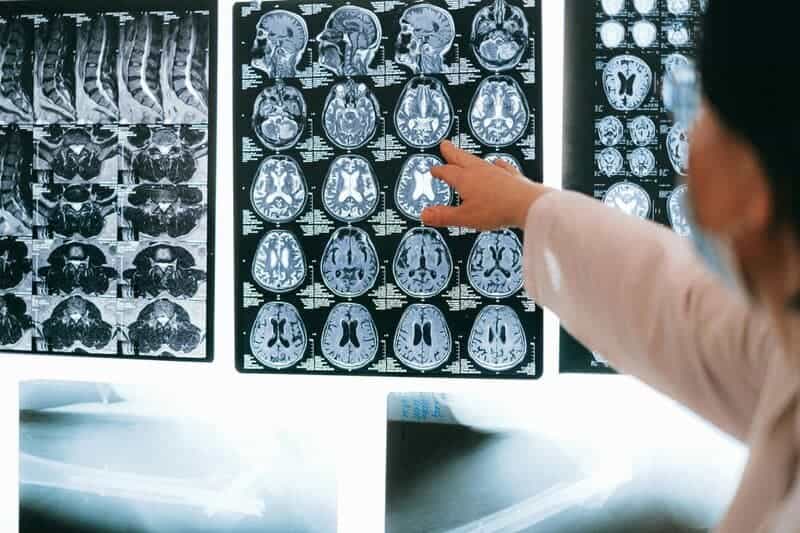
Reduplicative Paramnesia is a rare disorder where an individual believes that a familiar place, such as a hospital or home, exists in two or more locations at once or has been duplicated. This striking misperception is often observed after brain injury or stroke and is closely related to other misidentification syndromes. It can be both confusing and distressing, significantly impacting a person’s sense of reality and orientation. Further reading
6. Diogenes Syndrome

Diogenes Syndrome is a severe behavioral disorder characterized by extreme self-neglect, compulsive hoarding, and pronounced social withdrawal. Most commonly seen in older adults, this syndrome stands apart from obsessive-compulsive hoarding by its marked indifference to personal hygiene and living conditions. People affected may live in squalor without distress or shame, making intervention challenging. It often signals underlying psychiatric or neurological issues and requires compassionate, multidisciplinary care. More details
7. Body Integrity Dysphoria

Body Integrity Dysphoria (BID) is a rare and complex psychological disorder where individuals experience an overwhelming desire to amputate healthy limbs or become disabled. This urge is rooted in a profound mismatch between one’s physical body and internal sense of self, often leading to significant distress. Unlike gender dysphoria, BID specifically concerns bodily completeness and identity. The condition prompts ongoing ethical debates in medicine, particularly regarding treatment and consent. See research
8. Ekbom’s Syndrome (Delusional Parasitosis)
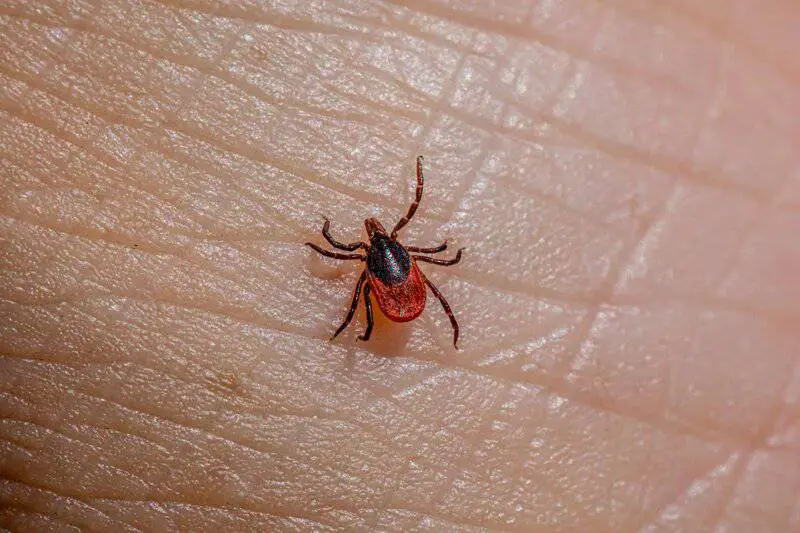
Ekbom’s Syndrome, also known as Delusional Parasitosis, is a psychological disorder in which individuals firmly believe they are infested with insects or parasites, despite clear medical evidence to the contrary. This conviction often leads to excessive skin picking, self-injury, and repeated medical visits. Unlike obsessive-compulsive disorder, the belief in infestation is fixed and unshakeable, making treatment challenging. The syndrome is more frequently diagnosed in older women. Read more
9. Depersonalization-Derealization Disorder

Depersonalization-Derealization Disorder is marked by ongoing or recurring feelings of being detached from oneself (depersonalization) or from the external world (derealization). People may feel as if they are living in a dream or observing themselves from outside their body. Unlike psychosis, individuals remain aware that these experiences are not reality. The disorder is often triggered by trauma or severe anxiety, and can be both unsettling and isolating. Learn more
10. Pica
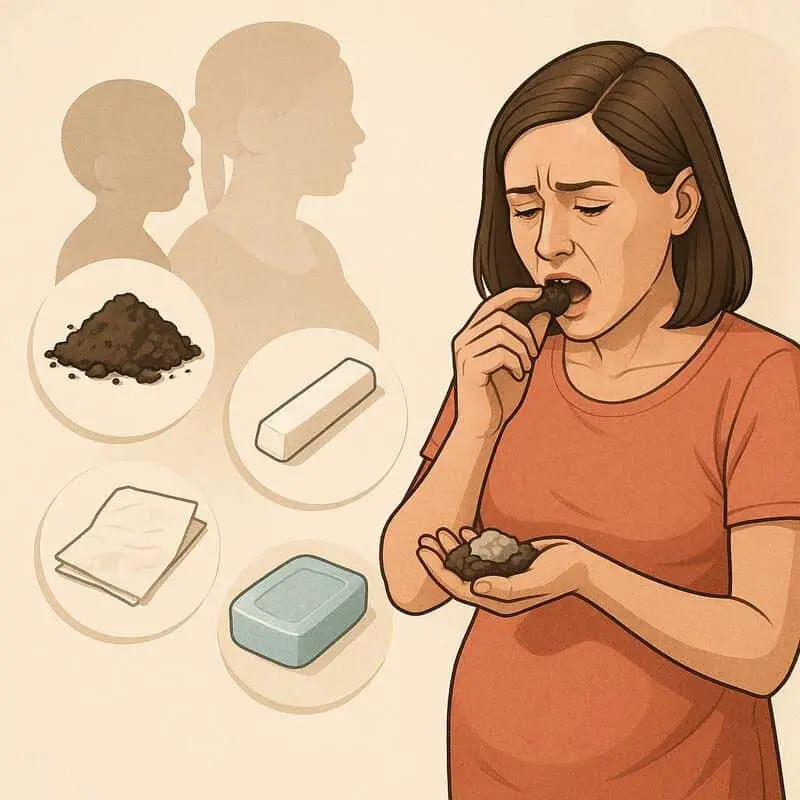
Pica is an unusual eating disorder in which individuals feel a persistent urge to consume non-food substances such as dirt, chalk, paper, or even soap. This condition is most frequently seen in children, pregnant women, and people with developmental disabilities, but it can affect anyone. Pica stands apart from disorders like anorexia or bulimia due to its focus on non-nutritive substances, which can lead to serious health risks. More info
11. Munchausen Syndrome

Munchausen Syndrome is a rare and complex disorder where a person deliberately feigns, exaggerates, or even induces physical or psychological illness in themselves to receive attention or sympathy. Unlike malingering, which is motivated by external rewards, Munchausen’s drive is purely emotional. A related form, Munchausen by proxy, involves caretakers fabricating or causing illness in those under their care, often children. This disorder can pose serious risks for both the individual and those around them. See details
12. Kluver-Bucy Syndrome
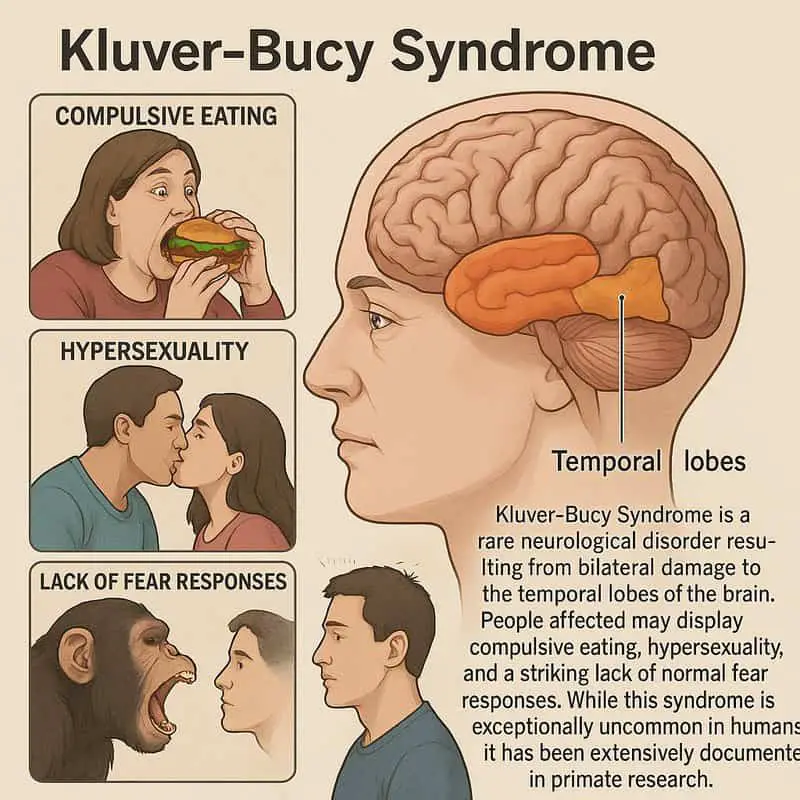
Kluver-Bucy Syndrome is a rare neurological disorder resulting from bilateral damage to the temporal lobes of the brain. People affected may display compulsive eating, hypersexuality, and a striking lack of normal fear responses. While this syndrome is exceptionally uncommon in humans, it has been extensively documented in primate research. Symptoms can be dramatic and disruptive, highlighting the vital role of the temporal lobes in regulating behavior and emotion. More information
13. Stendhal Syndrome

Stendhal Syndrome is a fascinating psychosomatic condition marked by sudden anxiety, confusion, rapid heartbeat, or even fainting when exposed to extraordinary works of art or breathtaking beauty. Most famously reported in Florence, Italy, this syndrome highlights the profound effect that art and beauty can have on the psyche. Unlike typical anxiety or panic attacks, Stendhal Syndrome is directly linked to overwhelming aesthetic experiences. Further reading
14. Foreign Accent Syndrome

Foreign Accent Syndrome is a rare speech disorder that can occur after a brain injury or stroke. Suddenly, individuals begin speaking with what sounds like a foreign accent, even though they’ve never lived in or learned the language of that region. Unlike language learning, this syndrome results from disruptions in the brain’s language centers, altering rhythm, pronunciation, and intonation. The change can be puzzling—and sometimes isolating—for both the speaker and those around them. Read about it
15. Exploding Head Syndrome
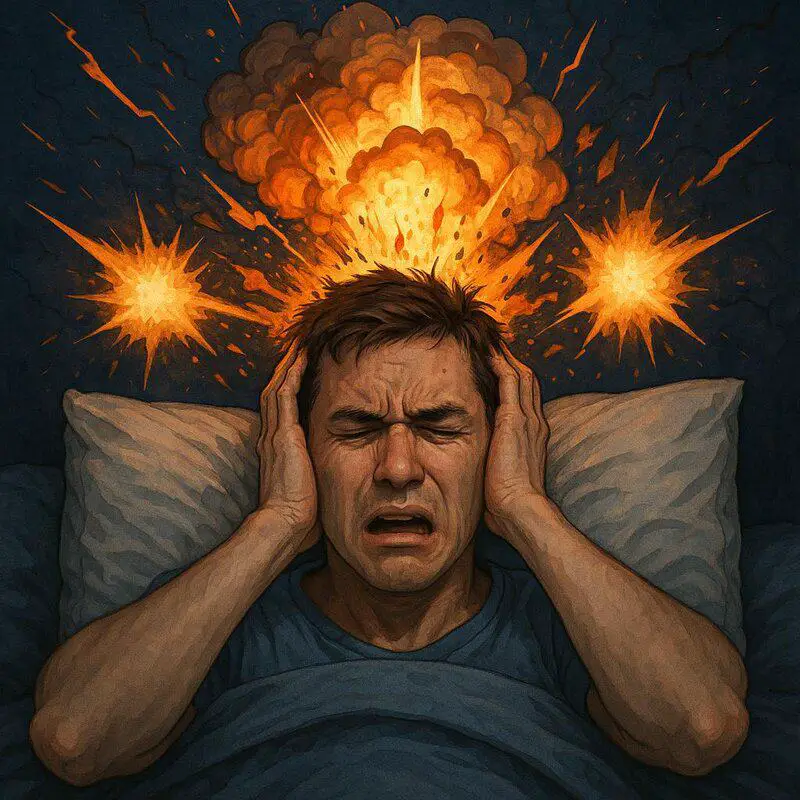
Exploding Head Syndrome is a startling but harmless sleep disorder in which individuals hear sudden, loud imaginary noises—such as explosions, crashes, or bangs—just as they are falling asleep or waking up. Though these sounds are not real, the experience can be extremely frightening and is sometimes mistaken for night terrors. While the condition itself poses no physical danger, repeated episodes can lead to anxiety about sleep. Learn more
Conclusion

Recognizing and understanding rare psychological disorders is crucial for expanding our appreciation of mental health’s true complexity. Even conditions that remain largely out of the public eye can deeply shape the lives of those affected, often bringing unique challenges and misunderstandings. By increasing awareness and supporting ongoing research, we help foster empathy and more inclusive care. These lesser-known disorders remind us that mental health is a vast, diverse landscape—far richer than the most familiar diagnoses suggest.
Disclaimer

This article is intended for informational purposes only and should not be considered a substitute for professional medical advice, diagnosis, or treatment. If you have concerns about your mental health or that of someone you know, please consult a qualified mental health professional. Your well-being matters—reach out for support when needed.
.article-content-img img { width: 100% }



Vielleicht interessiert es Sie:
13 Extraordinary Giants Ready to Blow Your Mind! 🌍
10 Chonky Oddities That Will Leave You Speechless! 🤯
9 Unbelievable Absolute Units That Will Leave You Speechless! 🌟
10 Colossal Creatures That Will Leave You Speechless! 🐻
12 Shocking Absolute Units You’ll Have to See! 😲
12 Epic Absolute Units That Will Challenge Your Perceptions! 🔥
Uncover the 11 Ultimate Massive Oddities That Awe! 🌍
9 Unbelievable Oddities That Redefine ‚Massive‘! 🐉💎